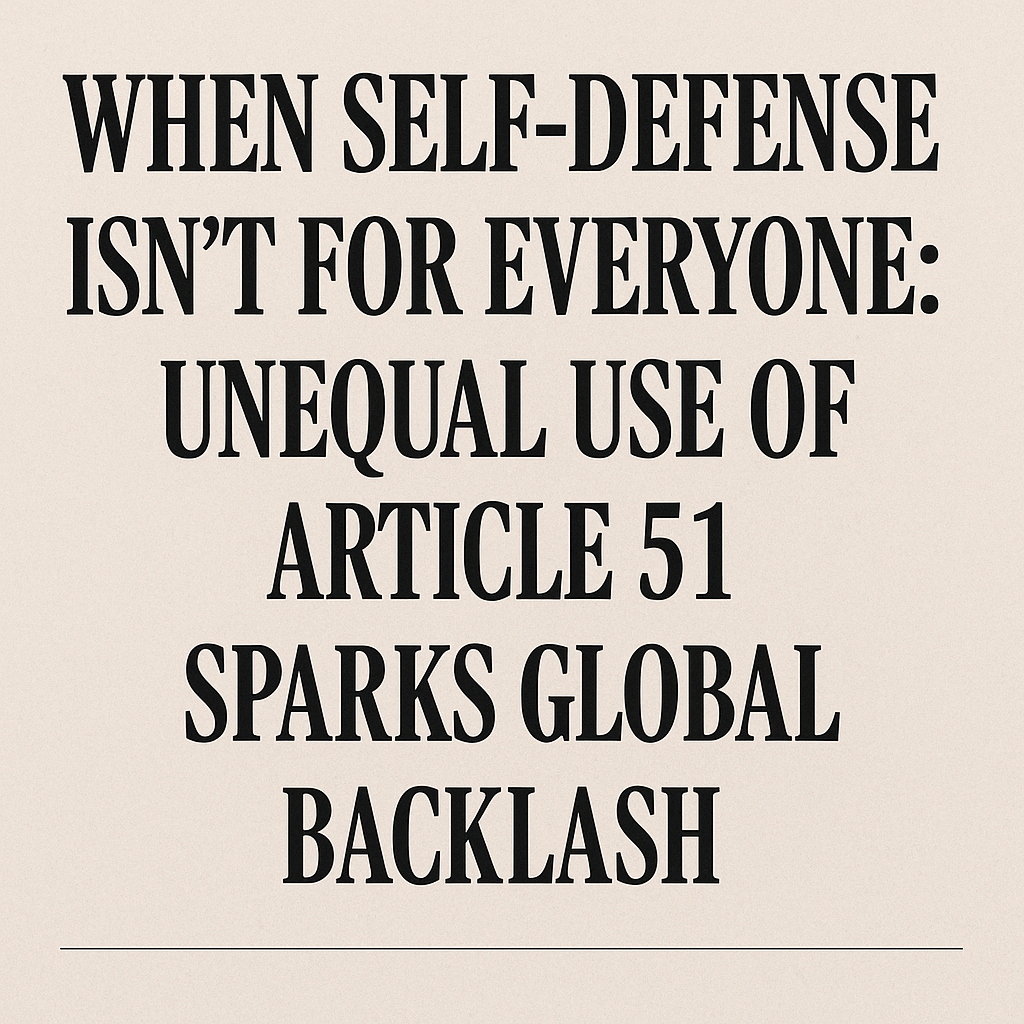FnF News
FNF News | International Law & Global Power Politics Published: June 14, 2025 By: Khadija Khan, International Law Correspondent
Selective Self-Defense: How Article 51 of the UN Charter Is Applied Unequally Across the World
New York / Tehran / Moscow / Addis Ababa / Islamabad — As Israel’s strikes on Iran echo through the halls of the United Nations, more and more diplomats, legal experts, and countries from the Global South are speaking out. They say Article 51 of the UN Charter—the rule that gives countries the right to defend themselves—is not being treated fairly. Countries close to the West are allowed to use it freely, while others are ignored or criticized when they try to do the same.
Iran’s Claim of Self-Defense Denied
In April 2025, Israel bombed Iran’s consulate in Damascus, killing several senior Iranian military officials. In response, Iran launched drones and missiles at Israel. Iran said this was legal under Article 51 of the UN Charter, which gives countries the right to defend themselves if attacked.
However, many Western countries did not agree. The U.S., U.K., France, and others criticized Iran for its retaliation but did not speak out against Israel’s original attack. U.S. Secretary of State Antony Blinken called Iran’s response “a dangerous escalation” but said nothing about Israel hitting a diplomatic site.
An Iranian diplomat said during a UN meeting, “It looks like Article 51 only counts when it helps NATO countries.”
What Article 51 Says
Article 51 of the UN Charter reads:
“Nothing in the present Charter shall impair the inherent right of individual or collective self-defense if an armed attack occurs against a Member of the United Nations.”
Experts like Dr. Mary Ellen O’Connell from the University of Notre Dame say this rule applies to every UN member. “The law is clear,” she said. “All countries have the right to self-defense. The problem is how selectively that right is accepted.”
Unequal Use of the Law
This isn’t the first time countries have been treated differently under Article 51. Ukraine was supported by the West when it used Article 51 after Russia invaded in 2022. Israel is almost always defended when it says it is acting in self-defense.
But when Iran, Syria, the Houthis in Yemen, or Ethiopia try to use the same law, they are ignored or blamed. Palestinian groups, for example, are never officially described as acting in self-defense—even when they are responding to attacks.
“There is a double standard in how this law is applied,” said Professor Makau Mutua, a former UN advisor. “It’s like self-defense is a special right only given to certain countries.”
How It Shows in Practice
The Quincy Institute recently published a report showing that the U.S. and its allies have used Article 51 for military actions many times, including in Syria, even without permission from Syria’s government. But when Syria tried to defend itself from outside forces, its right to self-defense was rejected.
In Africa, Ethiopia used Article 51 during the Tigray war, but Western governments questioned it. The Houthis in Yemen have said they are defending themselves against Saudi airstrikes, but their claims are often dismissed as false.
Pakistan’s Clear Statement at the UN
At a UN Security Council meeting in May 2025, Pakistan gave a strong speech against Israel’s attack on Iran. Pakistan called the attack “unprovoked, unjustified, and illegal.” It said Iran had the right to defend itself and showed full support for the people of Iran.
Pakistan’s ambassador warned that picking and choosing when to apply the law would weaken the UN’s credibility. “The rules must apply to everyone,” he said.
Global South Demands Fairness
Countries like Brazil, South Africa, China, Russia, and Pakistan have formally asked the UN to apply the law equally. In a letter to the UN General Assembly, they wrote that using Article 51 unfairly hurts the trust in international law.
South Africa’s delegate said, “If international law isn’t equal for all, then it’s not really law.”
Volker Türk, the UN’s top human rights official, also warned in a June 2025 report that bias in applying laws is damaging the entire system.
How the Media Affects Perception
Western media often supports their own governments’ views. A study by the University of Geneva found that during the 2023 Gaza conflict, the term “self-defense” was used for Israeli actions 14 times more often than for Palestinian ones.
“Media has a strong role in shaping what people think is legal,” said Dr. Lina Abu Ghaida, who worked on the study. “If the media only talks about one side’s right to defend itself, it helps create unfairness.”
What It Means for Peace
Experts say this unfair treatment of Article 51 could make global conflicts worse. If countries believe the law only protects powerful nations, they may stop trusting or following international rules.
“We’re already seeing the system fall apart in places like Yemen and Syria,” said Dr. O’Connell. “This will only bring more conflict and instability.”
One Law, Two Realities
The UN Charter was supposed to create peace by treating all countries equally. But if the right to self-defense continues to be used only for some and denied to others, the whole system could break down.
“Self-defense is not a gift,” said Professor Mutua. “It’s a right—and it should be treated like one.”
Sources:
- United Nations Charter, Article 51
- Reuters coverage of Iran-Israel April 2025 conflict
- Quincy Institute for Responsible Statecraft reports
- Amnesty International and Human Rights Watch statements
- University of Geneva Journalism and War Lab study
- Interviews with Dr. Mary Ellen O’Connell, Prof. Makau Mutua, and Dr. Lina Abu Ghaida
- UNHRC Reports, June 2025
- Official statements from governments of Brazil, South Africa, China, Pakistan
- UN Security Council public transcripts, April–June 2025

